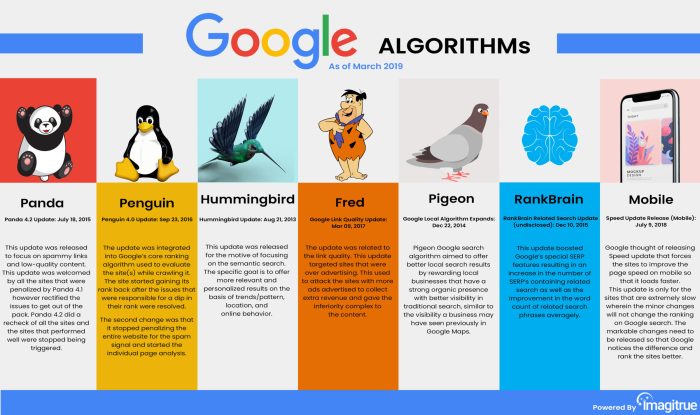Understanding SEO Algorithms – Understanding Algorithms sets the stage for this enthralling narrative, offering readers a glimpse into a story that is rich in detail and brimming with originality from the outset. Dive into the world of algorithms and unlock the keys to online visibility and success.
Understanding Algorithms
algorithms are like the secret sauce that search engines use to determine which websites rank higher in search results. They play a crucial role in optimizing websites to improve their visibility and attract more organic traffic.
Main Components of Algorithms
- s: s are the foundation of algorithms. They help search engines understand the relevance of a website to a user’s search query.
- Backlinks: Backlinks are links from other websites that point to your site. They act as upvotes and signal to search engines that your content is valuable and trustworthy.
- Content Quality: High-quality, relevant, and engaging content is essential for success. Search engines prioritize websites that provide valuable information to users.
- User Experience: Factors like website speed, mobile-friendliness, and ease of navigation contribute to a positive user experience, which is a key ranking factor in algorithms.
Role of Machine Learning and AI in Modern Algorithms, Understanding SEO Algorithms
Machine learning and AI have revolutionized by enabling search engines to analyze vast amounts of data and deliver more accurate search results. These technologies help search engines understand user intent, personalize search results, and detect patterns to improve ranking algorithms.
Types of Algorithms

algorithms play a crucial role in determining how websites rank in search engine results. Two major types of algorithms are Google’s PageRank and Panda, each with its own unique functions and impacts on search engine results.
Google’s PageRank
Google’s PageRank algorithm evaluates the importance of web pages based on the number and quality of links pointing to them. The algorithm assigns a numerical value to each page, known as PageRank score, which influences its position in search results. Websites with higher-quality backlinks tend to rank higher in Google’s search results.
Google’s Panda
Google’s Panda algorithm focuses on the quality of content on websites. It penalizes sites with low-quality or duplicate content by lowering their ranking in search results. On the other hand, websites with original, valuable content are rewarded with higher rankings. Examples of websites negatively impacted by Google’s Panda algorithm include content farms that produce low-quality content for the sole purpose of attracting traffic.
Impact on Search Results
- PageRank: Websites with strong backlink profiles tend to rank higher in search results, as the algorithm values quality links.
- Panda: Websites with high-quality, original content are favored by the Panda algorithm and rank higher in search results, while sites with poor content quality are penalized.
Factors Influencing Algorithms
Search engine algorithms are influenced by various factors that determine how websites are ranked in search results.
Content Quality
Quality content plays a crucial role in algorithms as search engines prioritize websites that offer valuable and relevant information to users. Content should be well-written, engaging, and tailored to target audience interests.
Backlinks
Backlinks are essential for as they indicate the credibility and authority of a website. Search engines consider the number and quality of backlinks pointing to a site when ranking it in search results.
User Experience
User experience is another important factor in algorithms as search engines aim to deliver the best results to users. Factors like page speed, mobile-friendliness, and easy navigation contribute to a positive user experience.
Changes in algorithms can have a significant impact on website traffic and rankings. Websites must adapt to algorithm updates by focusing on these key factors to maintain or improve their search engine visibility.
Adapting to Algorithm Changes: Understanding SEO Algorithms

Adapting to algorithm changes is crucial for maintaining a strong online presence and ensuring high visibility on search engines. With search engines constantly updating their algorithms to provide the most relevant results to users, it is essential for website owners and digital marketers to stay informed and adjust their strategies accordingly.Monitoring algorithm changes on a regular basis is key to understanding how search engines are evolving and what factors are being prioritized in search rankings.
By keeping a close eye on algorithm updates, businesses can identify any potential impact on their website’s performance and make necessary adjustments to improve their efforts.Successful adaptation to major algorithm updates often involves a combination of data analysis, content optimization, and technical adjustments. For example, after Google’s Panda update, which focused on content quality and relevancy, websites that updated their content to be more informative and user-friendly saw significant improvements in their search rankings.
Strategies for Adapting to Algorithm Changes
- Regularly monitor industry news and updates from search engines to stay informed about algorithm changes.
- Conduct regular audits to identify any issues or areas for improvement on your website.
- Focus on creating high-quality, relevant content that aligns with search engine guidelines and user intent.
- Stay up-to-date on best practices for on-page and off-page to ensure your website is optimized for search engines.
- Utilize data analytics tools to track the performance of your efforts and make data-driven decisions for optimization.
Future Trends in Algorithms
As technology continues to evolve, the future of algorithms is likely to see significant changes. Businesses need to stay ahead of the curve to ensure their websites remain optimized for search engines.
Impact of Voice Search
Voice search is becoming increasingly popular with the rise of virtual assistants like Siri and Alexa. algorithms will need to adapt to understand natural language queries and provide relevant results based on voice search.
Mobile-First Indexing
With the majority of internet users now browsing on mobile devices, search engines are prioritizing mobile-first indexing. This means websites need to be mobile-friendly to rank well in search results, and algorithms will continue to prioritize mobile optimization.
Other Emerging Trends
Other emerging trends like artificial intelligence, user experience, and video content will also impact algorithms. Businesses should focus on creating high-quality, engaging content that meets the needs of users to stay competitive in search rankings.
Preparing for Changes
To prepare for upcoming changes in search engine algorithms, businesses should stay informed about industry trends, regularly update their strategies, and focus on providing valuable content that aligns with the latest best practices.